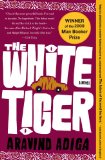Summary | Excerpt | Reading Guide | Reviews | Beyond the Book | Readalikes | Genres & Themes | Author Bio

A Novel
by Aravind Adiga
"Oh, to hell with his mother!" Kusum shouted. "She was a crazy one, and she's dead, and thank goodness. Now listen to me: let the boy go to the tea shop like Kishan, that's what I say."
The next day my father came with me to my school, for the first and last time. It was dawn; the place was empty. We pushed the door open. A dim blue light filled the classroom. Now, our schoolteacher was a big paan-and-spit man -- and his expectorate made a sort of low, red wallpaper on three walls around us. When he went to sleep, which he usually did by noon, we stole paan from his pockets; distributed it amongst ourselves and chewed on it; and then, imitating his spitting style -- hands on hips, back arched slightly -- took turns spitting at the three dirty walls.
A faded mural of the Lord Buddha surrounded by deer and squirrels decorated the fourth wall -- it was the only wall that the teacher spared. The giant lizard the color of a half-ripe guava was sitting in front of this wall, pretending to be one of the animals at the feet of the Lord Buddha.
It turned its head to us; I saw its eyes shine.
"Is this the monster?"
The lizard turned its head this way and that, looking for an exit. Then it began banging the wall. It was no different from me; it was terrified.
"Don't kill it, Daddy -- just throw it out the window, please?"
The teacher was lying in one corner of the room, reeking of booze, snoring soundly. Near him was the pot of toddy he had emptied the previous night -- my father picked it up.
The lizard ran, and he ran behind it, swinging the pot of toddy at it.
"Don't kill it, Daddy -- please!"
But he wouldn't listen. He kicked the cupboard, and the lizard darted out, and he chased it again, smashing everything in his way, and yelling, "Heeyaa! Heeyaa!" He pounded it with the pot of toddy until the pot broke. He smashed its neck with his fist. He stamped on its head.
The air became acrid: a stench of crushed flesh. He picked the dead lizard up and flung it out the door.
My father sat panting against the mural of the Lord Buddha surrounded by the gentle animals.
When he caught his breath, he said, "My whole life, I have been treated like a donkey. All I want is that one son of mine -- at least one -- should live like a man."
What it meant to live like a man was a mystery. I thought it meant being like Vijay, the bus conductor. The bus stopped for half an hour at Laxmangarh, and the passengers got off, and the conductor got down to have a cup of tea. Now, he was a man all of us who worked in that tea shop looked up to. We admired his bus-company-issue khaki uniform, his silver whistle and the red cord from which it hung down from his pocket. Everything about him said: he had made it in life.
Vijay's family were pigherds, which meant they were the lowest of the low, yet he had made it up in life. Somehow he had befriended a politician. People said he had let the politician dip his beak in his backside. Whatever he had to do, he had done: he was the first entrepreneur I knew of. Now he had a job, and a silver whistle, and when he blew it -- just as the bus was leaving -- all the boys in the village went crazy and ran after the bus, and banged on its sides, and begged to be taken along too. I wanted to be like Vijay -- with a uniform, a paycheck, a shiny whistle with a piercing sound, and people looking at me with eyes that said, How important he looks.
Two a.m. already, Mr. Premier. I'll have to stop for tonight fairly soon. Let me put my finger on the laptop screen, and see if there is any other useful information here.
Leaving out a few inessential details...
...in the Dhaula Kuan area of New Delhi, on the night of September 2, near the ITC Maurya Sheraton hotel...
Now, this hotel, the Sheraton, is the finest in Delhi -- I've never been inside, but my ex-boss, Mr. Ashok, used to do all his late-night drinking there. There's a restaurant in the basement that's supposed to be very good. You should visit it if you get the chance.
Copyright © 2008 by Aravind Adiga
Your guide toexceptional books
BookBrowse seeks out and recommends the best in contemporary fiction and nonfiction—books that not only engage and entertain but also deepen our understanding of ourselves and the world around us.